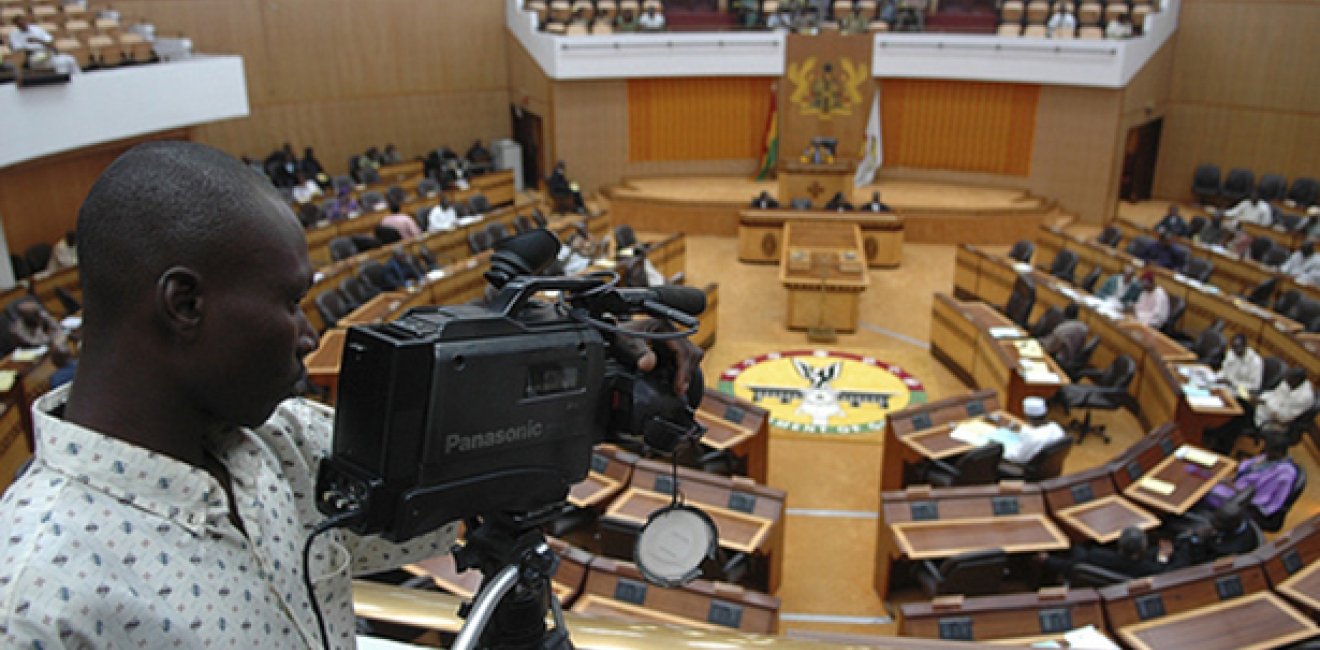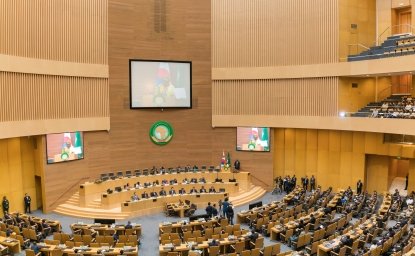
A blog of the Africa Program
The role of political parties in a democracy is uncontested. Indeed, representative democracy cannot operate without political parties. Political parties are the instruments for the conduct of elections in a democracy. They serve as the mobilizing force for elections in a multi-party democracy. However, there is no doubt that the maintenance of effective political parties in between elections, and campaign financing during elections, are increasingly becoming expensive projects. Certainly, debate on political party financing, especially on campaign financing, has dominated the literature on multiparty elections with various propositions of ideal modes of practice. Dominant among these propositions are (1) state funding of political parties and (2) legal and constitutional reforms to regulate political party campaign financing.
This blog seeks to contribute to the debate by elaborating on the Ghanaian situation. Although there are merits for state funding of political parties, it is unclear whether ordinary Ghanaians would support it. Given the present state of the Ghanaian political economy - financial hardships and increasing perceptions of elite corruption - it seems highly unlikely that the public would acquiesce to state financing of political parties.
Political parties are unquestionably the building blocks of representative democracy. In his justification for effective party assistance, Mathias Caton elaborated on three crucial roles parties play in a democracy: offering citizens meaningful choices in governance, avenues for political participation, and opportunities to shape their country's future. Political parties may not always be favored by the populace, and in some cases may not live up to their responsibilities, but they continue to be entrusted with the most crucial role in democracy.
Competitive elections have increased the cost of running effective political parties. Political must mobilize funds in order to execute the numerous functions they perform in democratic dispensations. Various research findings have confirmed that funding remains the major challenge in running effective political parties. Yet parties' funding sources have been under public scrutiny plagued by suspicion of corruption. As noted by IDEA (ibid) "Parties are under increasing pressure, faced with a vicious circle of escalating costs of campaigning, declining or negligible membership income, and deepening public mistrust about the individual role of money in politics."
Public fury about increasing party expenditure dominates the literature with divergent views. However, there seem to be convergent views on the necessity for regulated political party funding. Major concerns often raised about political party financing revolve around accountability: how much can parties spend on an election, how much information on party funding should be made public, which institutional mechanisms should be applied to regulate party financing, and most importantly, what role should the state play in political party funding.
Political Parties in Ghana
Five political parties have ruled Ghana since independence. However, the National Democratic Congress (NDC) and the New Patriotic Party (NPP) have been the two dominant parties since the dawn of Ghana's fourth republic. The 1992 Fourth Republican Ghana Constitution defines the regulatory framework for elections administration. The Constitution establishes the Ghana Elections Management Body and clearly defines its functions. Again, the Constitution allows formation of political parties whose operations conform to the laws of the land. The Ghana Political Parties Act (574), however, operationalizes the political parties' regulations as stipulated in the 1992 Constitution. Article 21 of the Political Parties Act prescribes the rules for financial reporting while Article 23 regulates the funding of political parties. Even though the state and the media endorse political parties during elections, the argument is that this may not be enough to sustain the political parties and create equal opportunities for all parties. Political parties therefore cultivate their own funding.
While regulatory frameworks exist for political party financing, the laws do not provide adequate guidelines and limits to parties' fundraising. Political parties therefore manipulate the system and abuse the laws with impunity. Parties are supposed to file financial reports with the Electoral Commission within six months of the end of every year, declaring the sources of their income, how much was raised, and how the money was spent. The Electoral Commission is mandated to audit parties' accounts and to sanction parties that do not conform to the law. [Aside: However, I have yet to witness any political party which has ever fully conformed to the laws or any sanctions applied to any political party by the Electoral Commission.]
Will Ghanaians support Public Funding for Political Parties?
The evidence collected from surveys on public attitudes is varied. Ninsin (2006) states that opinion polls indicate that the majority of Ghanaians do not support state funding of political parties. A CDD-Ghana survey on 'Political Parties Financing in Ghana' in 2004 revealed that over 80% of Ghanaians think that parties could perform their functions effectively if they were well-resourced. However, only 53% of them agreed to state funding of parties. Nam-Katoti, Quartey, Abor and Doku (2011) conclude that political party executives are more inclined to state funding of parties than the civil society. However, Aryee, Anebo and Debrah (2007) uncovered increasing public support for state funding of political parties.
Even though there are strong arguments for state funding of political parties, the present economic situation in Ghana besets any move or discussion on the subject:
- In 2013, there were more than seven strike actions from organized labor over economic hardships. They demanded better conditions of service;
- Water and electricity prices were increased by more than 50% in 2013;
- Taxes were adjusted with 2.5% increase in Value Added Tax (VAT);
- Tolls and fees were increased leading to overwhelming increases in the cost of doing business especially, at the harbors;
- The government has announced its intention to withdraw allowances and financial assistance to students of the Colleges of Education and the Nursing and Midwifery training colleges;
- Infrastructural development in the country has stagnated, ongoing road and construction projects have been suspended, and the government has announced a suspension of awarding new contracts;
- Contractors have not been paid for an extended period, some spanning over two years;
- School grants for subsidizing meals for both public primary schools and senior high schools (as provisioned by the National School Feeding Program) are heavily indebted;
- There is a lack of services and access to public goods, such as a lack of potable water in the villages, erratic and expensive electricity systems, and increasing incidents of armed robbery;
- The government has frozen public employment since 2009;
- The government is struggling to pay competitive salaries to public workers under a new salary scheme dubbed 'Single Spine Salary Structure'.
What is even worse is that data from recent corruption surveys show high public perception of corruption among politicians. Indeed, the public perception of political corruption is bolstered by numerous corruption charges leading to the government establishment of commissions of enquiry: Commission on the alleged corruption at Ghana Youth Employment and Entrepreneurial Development (GYEEDA), Judgment Debt Commission, and Committee on Public Accounts Committee's report, etc.
Conclusion and Recommendations
Opinion polls might have shown public support for state funding, but current economic hardships may override earlier poll results. However, since state funding of political parties seems to be gaining ground, at least among the political elite, stakeholders must be prepared. The following prescriptions may help to counteract any governmental policy actions that do not conform to the will of the Ghanaian majority:
- The Political Parties Act (Act 574 of 2000) must be reviewed to reflect clear and strict guidelines on sourcing and accounting for party funding;
- The Electoral Commission should strictly enforce its regulatory measures including regular auditing of political party accounts and sanctioning;
- Politicians must work to improve the negative public perception of politicians, especially their perceived involvement in corrupt activities; and finally,
- The government should work to improve the economy and reduce the current hardships in the country.
Paul Aborampah Mensah, of the Ghana Center for Democratic Development, is a member of our Southern Voices Network and research fellow here at the Wilson Center.
Photo of lawmakers meeting during a session of Parliament in Accra, courtesy of the World Bank via Flickr. (License: CC-BY-NC-ND 2.0)
Author

Africa Program
The Africa Program works to address the most critical issues facing Africa and US-Africa relations, build mutually beneficial US-Africa relations, and enhance knowledge and understanding about Africa in the United States. The Program achieves its mission through in-depth research and analyses, public discussion, working groups, and briefings that bring together policymakers, practitioners, and subject matter experts to analyze and offer practical options for tackling key challenges in Africa and in US-Africa relations. Read more

Explore More in Africa Up Close
Browse Africa Up Close
State Actions, Narratives, and Ethnicity in Kenya




